Theo van Gogh (film director)
| Theo van Gogh | |
|---|---|
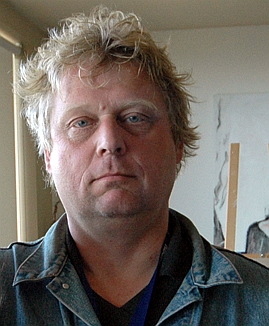 Theo van Gogh in 2004 |
|
| Born | Theodoor van Gogh July 23, 1957 The Hague, Netherlands |
| Died | November 2, 2004 (aged 47) Amsterdam, Netherlands |
| Cause of death | Murder |
| Occupation | Film director, Film producer, Columnist, Author, Actor |
| Known for | Submission |
| Religion | None, (Atheism) |
| Children | Liewe (born 1992) |
| Website | |
| www.theovangogh.nl | |
| Part of a series on the |
| Criticism of Islam |
|---|
| Issues |
| Islam · Muhammad · Qur'an · Islamism · Dhimmi · Eurabia Sharia · Jihad · Pan-Islamism Qutbism · Apostasy Domestic violence · Antisemitism Slavery · Terrorism Attitudes towards terrorism Homosexuality Divisions of the world Restoration of the Caliphate The Satanic Verses controversy Namus · Honor killings |
| Modern critics |
| Ayaan Hirsi Ali · Irshad Manji Daniel Pipes · Ibn Warraq Geert Wilders · Oriana Fallaci Pamela Geller · Robert Spencer · Theo van Gogh Afshin Ellian · Salman Rushdie · Christopher Hitchens Turan Dursun · Wafa Sultan Magdi Allam · Anwar Shaikh Walid Shoebat · Taslima Nasrin Mark A. Gabriel · Brigitte Gabriel · Pat Condell |
Theodoor "Theo" van Gogh (Dutch pronunciation: [ˈteːjoː vɑnˈɣɔx], July 23, 1957 – November 2, 2004) was a Dutch film director, film producer, columnist, author and actor. He was the great-grandson of Theo van Gogh, who was the brother of artist-painter Vincent van Gogh.
Van Gogh worked with Somali-born writer Ayaan Hirsi Ali to produce the film Submission, which was critical of the treatment of women in Islam. On 2 November 2004 he was assassinated by Mohammed Bouyeri, a Dutch-Moroccan Muslim. The last film he completed before his death, 06/05, is a fictional version of the assassination of politician Pim Fortuyn.
Contents |
Life
Theo van Gogh was born in The Hague. His great-grandfather was art dealer Theo van Gogh, brother of Vincent van Gogh. His father, Johan van Gogh, was a member of the Dutch secret service ('AIVD', then called 'BVD'). Theo's uncle, also named Theo, was executed as a resistance fighter during the German occupation.
After dropping out of law school, which he attended for one year at the University of Amsterdam, Theo van Gogh became a stage manager. His self-proclaimed passion was filmmaking, and he debuted as a director with the movie Luger (1981). He received a Gouden Kalf ("Golden Calf", the Dutch equivalent of the Oscar) for Blind Date (1996) and In het belang van de staat ("In the Interest of the State", (1997). For the latter, he also received a "Certificate of Merit" from the San Francisco International Film Festival. As an actor he appeared in the production De noorderlingen ("The Northerners", 1992). After that, he worked for television and wrote provocative columns for Metro and other newspapers.
Van Gogh was a writer of polemic prose. His often aggressive tone and personal animosities got him involved in a number of public lawsuits against other writers and public figures, and got him fired as a columnist at a succession of magazines and periodicals. This forced him to seek refuge in his own website, called De Gezonde Roker ("The Healthy Smoker").[1] The site's name, which is also the title of one of his books, was an allusion to his notorious chain smoking and to the "politically correct" negative stance towards smoking in society. In general, Van Gogh had a strongly nihilistic outlook on life, as displayed by episodes of heavy drinking, his open use of cocaine and a cynical view of relationships. (Later in life, he would adopt a healthier lifestyle, claiming it was for the sake of his son.)
Although he seemed to enjoy his life, he said he would not mind dying if it were not for his young son. His last book (2003) was Allah weet het beter ("Allah Knows Best") in which he presented his views on Islam in his typically cynical, mocking tone. He was a well-known critic of Islam, particularly after the September 11, 2001 attacks. He supported the nomination of the liberal (former PvdA Labour Party), Somalian-born female politician Ayaan Hirsi Ali for Dutch parliament.
Political views
Van Gogh was a member of the Dutch republican society Republikeins Genootschap which advocates the abolition of the Dutch monarchy, and a friend and supporter of the controversial Dutch politician Pim Fortuyn who was assassinated in 2002. He was also a staunch supporter of the 2003 invasion of Iraq, although he revised his stance to a more neutral one in 2004.
Controversial statements
In the 1980s, Van Gogh became a newspaper columnist, and through the years he used his columns to vent his anger at politicians, actors, film directors, writers and other people he considered to be part of "the establishment". He became a controversial figure who delighted in provocation. He considered himself to be a misunderstood visionary. He filled his website, "De Gezonde Roker" ("The Healthy Smoker"), with harsh criticism of multicultural society. He said this was sorely needed as the Netherlands was experiencing a social turmoil that threatened to turn it into a "type of Belfast" in a few years.[1]
He incurred the anger of leading members of the Jewish community by making comments about what he saw as the Jewish preoccupation with Auschwitz. This quote from a 1991 magazine interview is a typical example of such commentary: Van Gogh explained a "smell of caramel" by stating that "today they're only burning diabetic Jews". When he was criticized by the Jewish historian Evelien Gans, he wrote in Folia Civitatis, the weekly newspaper of the University of Amsterdam: "I suspect that Ms. Gans gets wet dreams about being fucked by Dr Mengele." He also expressed the wish that she would sue him so that she would have to explain in court why his remarks were false.
Van Gogh rejected every form of religion, and in the late 1990s he started to focus on Islam. He felt strongly that political Islam is an increasing threat to liberal western societies, and said that, if he'd been younger, he would have emigrated to the U.S.A..
One of the few politicians who seemed to be exempt from Van Gogh's criticisms was the right-wing politician Pim Fortuyn, who was assassinated in 2002. Van Gogh usually referred to him as the "divine baldhead". After Fortuyn's death, Van Gogh continued attacking the remaining members of the Pim Fortuyn List as he did other politicians. His political idol from then on was Ayaan Hirsi Ali.
Submission
Working from a script written by Ayaan Hirsi Ali, van Gogh created the 10-minute movie Submission. The movie deals with the topic of violence against women in some Islamic societies, telling the stories, using visual shock tactics, of four abused Muslim women. The title itself, "Submission", is a translation of the word "Islam" into English, referring to Muslims' submission before God. In the film, women's naked bodies are veiled with semi-transparent shrouds as they kneel in prayer, telling their stories as if they are speaking to Allah. Qur'anic verses some argue are unfavourable to women are projected onto their bodies in Arabic. In August 2004, after the movie's broadcast on Dutch public TV, newspaper De Volkskrant reported on claims of plagiarism against Hirsi Ali and Van Gogh, made by internet journalist Francisco van Jole. Van Jole said the duo had "aped" the ideas of Iranian-American video artist Shirin Neshat, whose work made abundant use of Arabic text projected onto bodies. After the broadcast of Submission, Van Gogh and Hirsi Ali also received death threats. Van Gogh did not take these very seriously and refused any protection, reportedly telling Ayaan Hirsi Ali: "Nobody kills the village idiot", a term he frequently used to refer to himself.[2]
Assassination
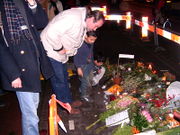
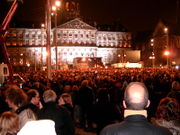
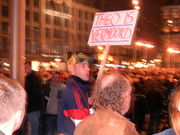
Mohammed Bouyeri murdered Van Gogh in the early morning of 2 November 2004, in Amsterdam, in front of the Amsterdam East borough office (stadsdeelkantoor) on the corner of the Linnaeusstraat and Tweede Oosterparkstraat (), while he was cycling to work.[3] Bouyeri shot van Gogh eight times with an HS 2000 handgun, and Van Gogh died on the spot. Bouyeri then attempted to decapitate him with one knife,[4] and stabbed him in the chest with another. The two knives were left implanted in his torso, one attaching a five-page note to his body. The note (Text) threatened Western countries, Jews and Ayaan Hirsi Ali (who went into hiding).[5][6] The note also contained references to the ideologies of the Egyptian organization Takfir wal-Hijra.
The killer, Mohammed Bouyeri, a 26-year-old Dutch-Moroccan citizen, was apprehended by the police after being shot in the leg. Bouyeri has alleged terrorist ties with the Dutch Hofstad Network. He was also charged with the attempted murder of several police officers and bystanders, illegal possession of a firearm, and conspiring to murder others, including Hirsi Ali. He was convicted on 26 July 2005 and sentenced to life in prison with no chance of parole.[7]
Imam Fawaz of the as-Sunnah Mosque in The Hague gave a sermon several weeks before the murder in which he called Theo van Gogh "a 'criminal bastard' and prayed for the filmmaker to be afflicted with an incurable disease."[8]
The murder of Theo Van Gogh sparked a storm of outrage throughout the Netherlands. Flowers, notes, drawings, and other expressions of mourning were left at the scene of the murder.[9]
Van Gogh was cremated on 9 November 2004 in Amsterdam. During the memorial service, Lou Reed's "Perfect Day" was played; a pack of cigarettes and a bottle of liquor were placed on the coffin.
Aftermath
The day after the murder, Dutch police arrested eight Muslim radicals belonging to a group later referred to as the Hofstad Network. Six detainees were Dutch-Moroccans, one was Dutch-Algerian and one had dual Spanish-Moroccan nationality.
Following the murder, the Dutch Complaints Bureau for Discrimination on the Internet (MDI) received many complaints about websites praising the murder and making death threats against other people.[2]
At the same time, starting with four attempted arson attacks on mosques in the weekend of 5–7 November, a significant number of apparently retaliatory violent incidents and arson attacks took place [3] [10]. The Dutch Monitoring Centre on Racism and Xenophobia recorded a total of 106 violent incidents against Muslim targets in November. The National Dutch Police Services Agency (KLPD) recorded 31 occasions of violence against mosques and Islamic schools between 23 November and 13 March 2005.[4] The case that drew most attention was an arson attack that led to the destruction of a Muslim primary school in Uden in December 2004.[5]
By 8 November, Christian churches were in turn targeted in vandalism and arson attacks. A report for the Anne Frank Foundation and the University of Leiden, which counted a total of 174 violent incidents between 2–30 November, specifies that mosques were the target of violence 47 times, and churches 13 times.[6]
The murder widened and polarized the debate in the Netherlands about the position of the more than one million Muslims, and how they would be affected. Some Dutch citizens fear that the Netherlands will lose its traditional tolerance and Western liberalism, becoming increasingly influenced by Islamic viewpoints. These fears are fueled by population growth studies and projections that show the Muslim community growing much faster than that of the "autochtonen" (autochthonous Dutch). On the other hand, many Islamic Dutch residents feel discriminated against and singled out. The increasing polarization has led to calls from many religious leaders and politicians for calm and improved communication between the communities.
In an apparent reaction against controversial statements about the Islamic, Christian, and Jewish religions, such as those Van Gogh was renowned for, the Dutch Minister of Justice, Christian Democrat Piet Hein Donner, suggested the existing Dutch blasphemy laws should either be applied more stringently or made stricter. This had led to a counter call by the liberal D66 party to scrap the blasphemy laws altogether. This was rejected in parliament by the Dutch Christian parties and the Dutch Labour Party.
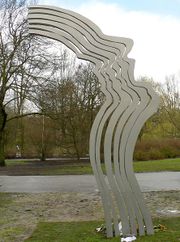
Independent Dutch member of parliament Geert Wilders (who was previously forced to leave the right-wing VVD party because of his views) advocated a five-year halt to non-Western immigration in the wake of van Gogh's murder, stating: "The Netherlands has been too tolerant to intolerant people for too long. We should not import a retarded political Islamic society to our country".[7] In opposition to such sentiments, campaigns for a kleurrijk Nederland ("colorful Netherlands"), such as Stop de Hetze (Stop the Witch Hunt) were started.
Geert Wilders and Ayaan Hirsi Ali went into hiding for several weeks. Wilders has been under the protection of bodyguards ever since and Hirsi Ali eventually relocated to the United States.
Theo van Gogh's son claims he has been attacked on several occasions by young people of Moroccan and Turkish descent, and that the police did not provide him with any help or protection.[11] The police deny receiving any report of attacks.[12][13]
On 18 March 2007, a sculpture in memory of Theo van Gogh was unveiled in Amsterdam, entitled De Schreeuw ("The Scream"). It is located in the Oosterpark, just a short distance from where van Gogh was murdered.[14][15][16][17]
A private trust, the Foundation for Freedom of Expression, was established to help fund protection for critics of Islam and Muslims.[18]
Murder and Index on Censorship
There was controversy in the English-speaking world after an article was published in the magazine Index on Censorship. The article, by the magazine's Associate Editor Rohan Jayasekera, claimed that Van Gogh was a "free-speech fundamentalist" who had been on a "martyrdom operation[,] roar[ing] his Muslim critics into silence with obscenities" in an "abuse of his right to free speech". Describing van Gogh's film Submission as "furiously provocative", Jayasekera concluded by describing his death as:
| “ | A sensational climax to a lifetime's public performance, stabbed and shot by a bearded fundamentalist, a message from the killer pinned by a dagger to his chest, Theo van Gogh became a martyr to free expression. His passing was marked by a magnificent barrage of noise as Amsterdam hit the streets to celebrate him in the way the man himself would have truly appreciated.
And what timing! Just as his long-awaited biographical film of Pim Fortuyn's life is ready to screen.[8] |
” |
There were many protests from both left- and right-wing commentators at the article, and Nick Cohen of The Observer (London)' wrote in December 2004, that:
| “ | When I asked Jayasekera if he had any regrets, he said he had none. He told me that, like many other readers, I shouldn't have made the mistake of believing that Index on Censorship was against censorship, even murderous censorship, on principle – in the same way as Amnesty International is opposed to torture, including murderous torture, on principle. It may have been so in its radical youth, but was now as concerned with fighting 'hate speech' as protecting free speech.[9] | ” |
Cohen's account of the conversation was repudiated by the editor of Index on Censorship in a letter to The Observer.[10]
Works
Publications
Van Gogh contributed to various newspapers and magazines.
He published the following books:
- Engel ("Angel", 1990)
- Er gebeurt nooit iets ("Nothing Ever Happens", 1993)
- Sla ik mijn vrouw wel hard genoeg? ("Do I Beat My Wife Hard Enough?", 1996)
- De gezonde roker ("The healthy smoker", 2000)
- Allah weet het beter ("Allah Knows Best", 2003)
- De tranen van Mabel ("The tears of Mabel", with Tomas Ross, 2004)
Filmography
- Luger (1982)
- Een dagje naar het strand ("A Day at the Beach", 1984)
- Charley (1986)
- Terug naar Oegstgeest ("Back to Oegstgeest", 1987)
- Loos ("Wild", 1989)
- Vals licht ("Fake Light", 1993)
- Ilse verandert de geschiedenis ("Ilse Changes History", 1993)
- 06 (1994)
- Reunie ("Reunion", 1994)
- Eva (1994)
- Een galerij: De wanhoop van de sirene ("A Gallery: The Despair of the Siren", 1994)
- De Eenzame Oorlog Van Koos Tak ("Koos Tak's Lonely War", 1995)
- Blind Date (1996)
- Hoe ik mijn moeder vermoordde ("How I Killed My Mother", 1996)
- In het belang van de staat ("In the Interest of the State", 1997)
- Au ("Ouch", 1997)
- De Pijnbank ("The Rack", 1998)
- Baby Blue (2001)
- De nacht van Aalbers ("Aalbers's Night", 2001)
- Najib en Julia (2002) television play based on William Shakespeare's Romeo and Juliet about the love between a white upper-class girl and a pizza delivery man of Moroccan descent.
- Interview (2003), cynical journalist interviews society actress.
- Zien ("Seeing", 2004)
- Submission (2004)
- Cool (2004) a film about young offenders, some of them of Moroccan descent. In the movie the offenders play themselves.
- 06/05 (2004), a film mixing fact and fiction around the assassination of Pim Fortuyn.
- Medea (2005), a modern day adaptation of Medea.
Unfinished projects
- Bad (A "lesbian road movie") Production was planned for 2005
- Duizend en één Dag ("Thousand and One Days"). A drama series about young Muslims struggling with their faith. Although this project had not even reached preproduction, Van Gogh had already found a broadcaster for the series: Dutch Muslim Broadcasting Organisation NMO.
See also
- Lars Vilks
- Kurt Westergaard
- Jyllands-Posten Muhammad cartoons controversy
- Multiculturalism in the Netherlands
- Criticism of multiculturalism
- Everybody Draw Mohammed Day
Notes
- ↑ ""Theo van Gogh – Controversial film-maker"". Independent.co.uk. http://www.independent.co.uk/news/obituaries/theo-van-gogh-749703.html. Retrieved April 29, 2010.
- ↑ Hirsi Ali, Ayaan, Infidel, 2007, page 314.
- ↑ Gunman kills Dutch film director. Retrieved 21 July 2009.
- ↑ "Terror on Trial in the Netherlands". Aina.org. November 2, 2004. http://www.aina.org/news/20051212121618.htm. Retrieved April 29, 2010.
- ↑ ""Controversial filmmaker shot dead"". Independent.co.uk. http://www.independent.co.uk/news/world/europe/controversial-filmmaker-shot-dead-531777.html. Retrieved April 29, 2010.
- ↑ ""Ayaan Hirsi Ali: My life under a fatwa"". Independent.co.uk. November 27, 2007. http://www.independent.co.uk/news/people/profiles/ayaan-hirsi-ali-my-life-under-a-fatwa-760666.html. Retrieved April 29, 2010.
- ↑ The Murder of Theo Van Gogh. Mohammed Bouyeri sentenced TRUtv Crime Library
- ↑ Barry Thorne & Claire Cavanagh: Did imam's sermon incite Van Gogh murder?, Radio Netherlands Worldwide, 31 October 2006
- ↑ Expressions of mourning for Theo van Gogh, kept at the Amsterdam City Archives
- ↑ ""Bombing of Muslim school linked to murder of film-maker"". Independent.co.uk. November 9, 2004. http://www.independent.co.uk/news/world/europe/bombing-of-muslim-school-linked-to-murder-of-filmmaker-532551.html. Retrieved April 29, 2010.
- ↑ Marokkanen slaan L. van Gogh in elkaar, Planet, 28 July 2005
- ↑ L. van Gogh niet mishandeld Het Parool, 28 July 2005
- ↑ Politie ontkent nalatigheid zaak zoon Van Gogh, Elsevier, 28 July 2005
- ↑ Monument Theo van Gogh revealed, NU.nl
- ↑ "Full text of speech by Hans Teeuwen". Hansteeuwen.net. October 22, 2006. http://www.hansteeuwen.net/index.ht/content/artikel_8. Retrieved April 29, 2010.
- ↑ page about De Schreeuw on the website of Stadsdeel Oost/Watergraafsmeer (in Dutch)
- ↑ Monument of Theo van Gogh vandalised with black felt writer (in Dutch), NU.nl
- ↑ "Dutch labour party ends political correctness". Digitaljournal.com. http://www.digitaljournal.com/article/264049. Retrieved April 29, 2010.
References
- ^ http://www.theovangogh.nl/
- ^ Muslims in the European Union: Discrimination and Islamophobia, p. 78 (European Monitoring Centre on Racism and Xenophobia)
- ^ Golf van aanslagen sinds dood Van Gogh (Brabants Dagblad)
- ^ Muslims in the European Union: Discrimination and Islamophobia, pp. 78–79
- ^ Muslims in the EU: Cities Report, The Netherlands. Preliminary research report and literature survey, p. 7 (Open Society Institute – EU Monitoring and Advocacy Program)
- ^ Ontwikkelingen na de moord op Van Gogh, p. 3 (Anne Frank Stichting; Universiteit Leiden)
- ^ Netherlands opposing immigration (The New York Times)
- ^ Free speech fundamentalist on a martyrdom operation (originally from Index on Censorship)
- ^ Censor and sensibility (The Guardian)
- ^ Letters to the Editor – Free to Speak (The Guardian)
Further reading
- Buruma, Ian, Murder in Amsterdam: The Death of Theo van Gogh and the Limits of Tolerance, London, The Penguin Press, 2006. ISBN 1-59420-108-0
External links
- Theo van Gogh (film director) at the Internet Movie Database
- Theo van Gogh (film director) at Allmovie
- (Dutch) De Gezonde Roker (The healthy smoker) – website of Theo van Gogh (website under revision)
- Theo van Gogh in the cinema (in Dutch)
- Theo van Gogh's polemic prose
- Inventory of the archive of drawings and texts remembering Theo van Gogh at the Amsterdam City Archives
About the movies "Submission" and "06/05"
- New York Times about "Submission"
- (Dutch) Website of the movie 06/05 about the murder of Pim Fortuyn – Streaming-video diaries by Van Gogh
- Broadband version excerpts (realvideo format) of "Submission" Dutch-language current affairs program with excerpts from the movie
- Lower resolution (realvideo format) of "Submission" Dutch-language current affairs program with excerpts from the movie
- Submission Part 1 (44 Mb avi)
Articles about the murder
- BBC report on slaying
- Controversial filmmaker murdered – IFEX
- Mini clash of civilizations – Arnaud de Borchgrave
- Dutch Filmmaker Theo Van Gogh Murdered – Associated Press, 2 November 2004
- 2 November – Death of a filmmaker includes translation of "suicide" note found on Mohammed Bouyeri
- "The silencing of Theo van Gogh" by Ronald Rovers, Salon.com (viewable after viewing a 15-second advertisement), 24 November 2004
- Crime Library Article about the murder and its aftermath.
- Author Ian Buruma discusses his book about Van Gogh's death, Murder In Amsterdam: The Death of Theo van Gogh and the Limits of Tolerance (video)
|
|||||